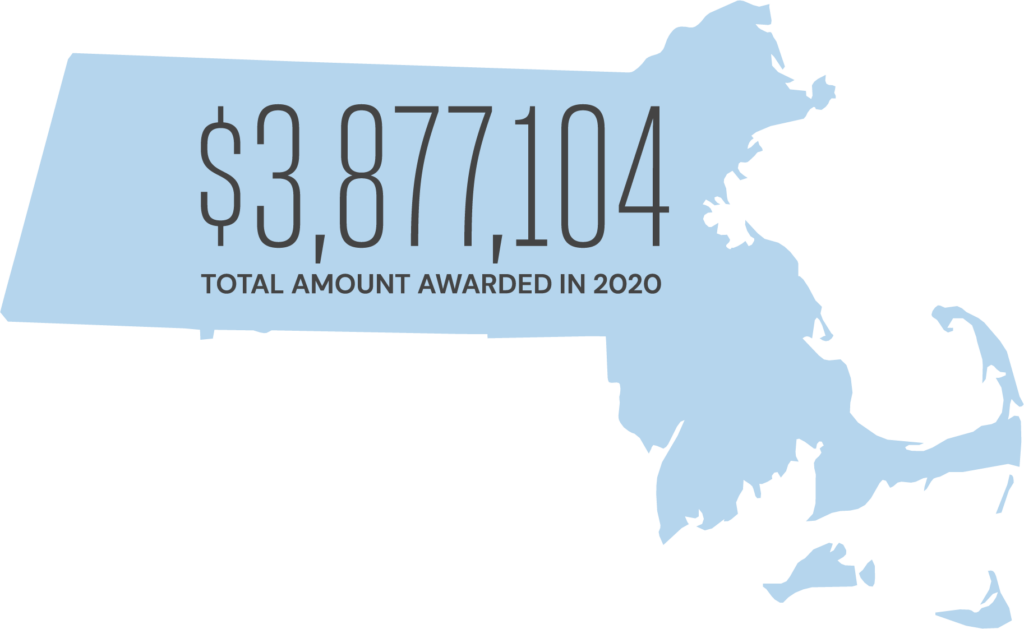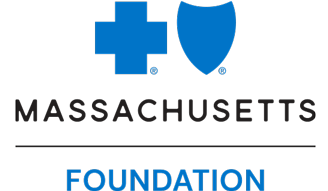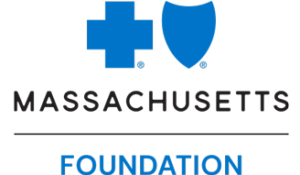A Year to Respond, Evolve, and Act
2020 Annual Report
Message from Our Leadership
The year 2020 was an extraordinary one for all of us. In the face of so much loss and instability, it is natural that many of us had moments of feeling stuck, or even defeated. But as we took time to honor and acknowledge the losses and challenges, we also witnessed Massachusetts respond to pressing needs, evolve our ways of thinking, and act toward measurable change. Throughout 2020, the Blue Cross Blue Shield of Massachusetts Foundation looked for ways to join and support those efforts by centering the voices of those closest to the impact.
RESPOND
In 2020 we responded to urgent threats to our Commonwealth’s residents, community-based organizations, and health care system, by providing funding, pragmatic policy analysis, and accessible opportunities for learning.
Responding to the Pandemic
The Foundation’s grant partners were at the forefront of the response to COVID-19 and we supported both our existing partners and new organizations by redirecting our Catalyst Fund and Special Initiatives grants to focus on communities hardest hit by the pandemic. We created flexibility within in our Connecting Consumers to Care grant program to allow those organizations to respond to community needs for COVID-19 education, screening, and vaccination. Our Strengthening the Voice for Access grant partners pressed decisionmakers to address inequities in COVID-19 policies and response. We engaged organizations serving homeless and immigrant clients to provide telehealth services, financial support, and food through our Special Initiatives grants.
Hear more from our grant partners about how Foundation funding allowed them to respond to the public health emergency of 2020.

In advance of the Supreme Court decision on California v. Texas–a case that sought to overturn the Affordable Care Act (ACA)—the Foundation issued a brief and companion infographic describing the stakes for the state’s health insurance coverage rates and federal funding. With more than 400,000 residents set to lose coverage at a cost of up to $3.3 billion per year, the potential impact of the final ruling was significant. This analysis was designed to equip policymakers and advocates with data to respond to this threat to access. The findings were covered in the Boston Globe, and were cited by Attorney General Maura Healey in her statements on the case to numerous media outlets.
EVOLVE
In 2020 we evolved our approach to addressing the social determinants of health by explicitly naming the role that structural racism plays in creating and maintaining racial inequities in health, and by investing in efforts to diversify the behavioral health workforce.
Evolving our Approach
The Foundation was established with a mission to expand access to health coverage and care for the state’s most marginalized communities. Both our grantmaking and policy initiatives have examined the impact of the social determinants of health on access to care and promoted solutions to the deep health inequities in our Commonwealth. Leading into 2020, the Foundation’s board began revising our strategic plan with the goal of reflecting our commitment to disrupt structural racism in order to eliminate inequities in health care access, quality, and outcomes. This new focus area builds on years of existing work on disparities, the social factors that impact health outcomes such as housing and food, and our leadership program that prepares emerging health leaders to confront racism embedded in the health care system.
Hear more from members of our board and advisory committee on why it was important for the Foundation to evolve to meet the longstanding challenge of structural racism and racial inequities in health and how that approach to equity can help advance the health care community.

On nearly all measures, Massachusetts residents indicate significant barriers to accessing behavioral health care. More than a third of non-elderly adults who sought behavioral health care in 2018 reported unmet treatment need, and there is a documented lack of providers of color with nearly ninety percent of behavioral health professionals nationwide identifying as non-Latino Caucasian. With these barriers comes an urgent need to evolve the approach to recruiting and retaining a diverse workforce. In 2020, we invested in the Behavioral Health Service Corps, an innovative pilot launched by William James College designed to introduce recent college graduates to the field through paid service in a community-based setting, course work that can be applied toward a graduate degree, and mentorship.
ACT
In 2020, amidst a steady increase in need for mental health and substance use resources, we provided necessary tools and funding for policymakers and providers to take action toward expanding timely access to behavioral health services.
Putting Ideas into Action
For the past 3 years, 6 existing Emergency Service Providers (ESPs) across the state have been building and testing a vision for behavioral health urgent care that will expand access to services for those experiencing mental health and substance use disorders. These organizations have used $1.2M per year in grant support from the Foundation to expand hours, increase geographic reach, incorporate medication assisted treatment for individuals with substance use disorder, improve access to prescribers and peer specialists, engage criminal justice partners in emergency department diversion, and implement telehealth. The learnings from this grant program, and from publications on behavioral health models, has been instrumental in guiding new state policy.
Hear more from leaders, frontline staff, people with lived experience, and policymakers on how the Foundation helps them put ideas into action.

Network of Care Massachusetts, the first statewide online resource directory of behavioral health resources, was launched in March 2020 just as the pandemic was taking hold. Since then, more than 80,000 visitors have used the site to take action for themselves or family members—by searching for treatment in their community, learning more about a mental health or substance use condition, or finding social service supports. Network of Care Massachusetts was built by the Massachusetts Association of Mental Health with funding from the BCBSMA Foundation, the MetroWest Health Foundation, and the C.F. Adams Trust and was guided by a steering committee composed of stakeholders in the mental health, substance use, public health, and social service sectors.
ORGANIZATION
Established with an endowment in 2001, the Foundation is a private, nonprofit organization governed by a 14 member Board of Directors. We collaborate with public and private organizations to broaden health coverage and reduce barriers to care through grants, research, and policy initiatives.
Grantmaking

Expanding Access to Behavioral Health Urgent Care
Strengthening the Voice for Access
Connecting Consumers to Care
Special Initiatives COVID-19
Special Initiatives
Network of Care
Catalyst Fund
Going Beyond Health Care
Policy & Research
Programs
The public health emergency meant that for the first time in its 19 year history, the Health Coverage Fellowship was rescheduled, and eventually held online. Despite these challenges, the 12 fellows were able to learn from national and international health experts battling the pandemic in real-time. While the 11th cohort of the Massachusetts Institute for Community Health Leadership program had to be postponed until 2021, State Senator Julian Cyr, a graduate of the 8th MICHL cohort, describes the enduring impact of this unique leadership program.
Policy & Research

Publications
Downloads
2020 Board of Directors
Manny Lopes
Chair
President and Chief Executive Officer, East Boston Neighborhood Health Center
Andrew Dreyfus
President and Chief Executive Officer, Blue Cross Blue Shield of Massachusetts
JD Chesloff
Executive Director, Massachusetts Business Roundtable
Sandro Galea, MD, DrPH
Robert A. Knox Professor and Dean, Boston University School of Public Health
Shelly Greenfield, MD, MPH
Chief Academic Officer, and the Kristine M. Trustey Endowed Chair of Psychiatry, McLean Hospital, Professor of Psychiatry, Harvard Medical School
Michael Hunter
Vice President, Business Development, Trinity Financial
Thea James, MD
Vice President of Mission, Associate Chief Medical Officer, and Director of the Violence Intervention Advocate Program (VIAP) at Boston Medical Center; Assistant Professor of Medicine at Boston University School of Medicine
Antonia McGuire, RN
Senior Consultant, John Snow, Inc.
Michael Miller
Strategic Policy Director, Community Catalyst
Bruce Nash, MD (retired from board July 2020)
Chief Physician Executive and Senior Vice President, Health and Medical Management, Blue Cross Blue Shield of Massachusetts
Mary Kay Leonard
Independent Consultant
Henry M. Thomas III, JD
President and Chief Executive Officer, the Urban League of Springfield, Inc.
Patricia Washington
Vice Chair
Board of Directors, Action for Boston Community Development (ABCD)
Audrey Shelto (ex-officio)
President and Chief Executive Officer, Blue Cross Blue Shield of Massachusetts Foundation







